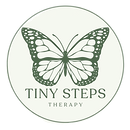Our books are currently full.
New client spaces will open in the new year.
Thank you for your understanding and support.

Occupational Therapy
Tiny Steps Therapy is built on the belief that neurodivergent people don’t need to be “fixed”—they need environments that work for them. Our approach is respectful, affirming, and collaborative, supporting individuals to access life in ways that fit their unique strengths and needs.
We don’t focus on making people “fit” into neurotypical expectations. Instead, we honour neurodivergent ways of thinking, moving, and interacting with the world.
Early Years Support
(0-6 Years)
What This Can Look Like:
-
Play-based support that follows a child’s interests and sensory preferences.
-
Family collaboration to create environments that feel safe and predictable.
-
Self-care strategies (dressing, eating, toileting) that honour sensory and motor differences.
-
Advocating for all communication styles (AAC, gesturing, scripts, and more).



OT for Children
(6-12 Years)
What This Can Look Like:
-
Home routines that work for your child, including transitions, organisation, and downtime.
-
Self-care skills (e.g., dressing, hygiene, meal times) taught in a way that reduces distress and prioritises autonomy.
-
Supporting emotional regulation through sensory strategies and alternative communication.
-
Building connections in a way that meets individual needs, whether that means structured activities, parallel play, shared interests, or alternative ways of engaging with others.

School-Based Supports
(Primary & Secondary)

What This Can Look Like:
-
Self-advocacy and accommodations to reduce overwhelm at school.
-
Exploring sensory needs and creating strategies that support focus and comfort.
-
Handwriting support and offering alternatives to traditional learning approaches.
-
Supporting teachers to understand neurodivergent learning styles.



NDIS Assessments &
Reports
What This Can Look Like:
-
Respectful, affirming assessments that acknowledge neurodivergent experiences.
-
Clear, practical recommendations that prioritise accessibility over "fixing."
-
Collaboration with individuals and families to ensure recommendations align with real-world needs.
-
Comprehensive reports for NDIS funding that reflect a person's genuine support requirements.


